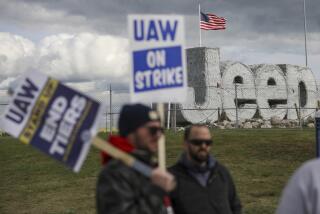Kick the automakers’ tires first
- Share via
The economic downturn is prompting a growing number of companies and consumers to file for bankruptcy, with more than 1 million petitions for bankruptcy protection expected by year’s end. Now, backers of the Big Three U.S. automakers warn that one or more of their number could fail too unless the federal government swoops in with $50 billion in aid. General Motors Corp. is in such a precarious financial state that an analyst at investment firm Deutsche Bank urged investors to dump the stock before it becomes worthless.
The Democratic leadership in Congress and President-elect Barack Obama have hinted about helping Detroit. But before they take that step, they need to consider how GM, Ford Motor Co. and Chrysler reached this point and what position they’ll be in after the economy rebounds. Last year, a study by UC Berkeley professor Kenneth E. Train and Brookings Institution economist Clifford Winston noted that U.S. automakers have been on a downward slide since 1970, with their share of the domestic car market falling from 86% in 1970 to 42% in 2005. In other words, their slippage started too long ago and has continued too steadily to have been caused by the factors cited over the years by Detroit, including healthcare costs, pension obligations, unfavorable exchange rates and, most recently, burdensome fuel-economy standards.
The best explanation for the declining popularity of the Big Three’s cars and trucks is that they haven’t kept pace with other brands in the features consumers value the most. It’s worth noting that many of those competing cars were made by U.S. workers at U.S. factories -- the ones owned by Toyota, Honda, BMW and other foreign firms. Some of the Big Three’s supporters have called for higher barriers to imported cars -- a move that could help free-trading partners Mexico and Canada but would be of limited benefit to Detroit. A 25% tariff on imported light trucks didn’t stop U.S. automakers from losing more than 20% of their market share, according to the study by Train and Winston.
Advocates for the Big Three say that bankruptcy, which would allow them to restructure more aggressively and shift huge pension costs onto the taxpayers, is not an option because it could wipe out any remaining loyalty to their brands. A $50-billion loan to the automakers, however, isn’t likely to bring about the changes the notoriously insular companies and their unions have resisted for three decades, especially if the companies continue under the same management. Before putting taxpayers on the hook for billions in aid, policymakers need to ask Detroit for change they can believe in.
More to Read
A cure for the common opinion
Get thought-provoking perspectives with our weekly newsletter.
You may occasionally receive promotional content from the Los Angeles Times.










